One decade ago today, the Environmental Protection Agency served a Notice of Violation to the Volkswagen Group for violating the Clean Air Act. The allegation? Volkswagen’s so-called TDI “Clean Diesel” engines actually weren’t so clean, and an apparent cheat device let Volkswagen get away with it for so long. Most of the affected cars have long been fixed, and diesel enthusiasts are still enjoying them. Here is what life is like a decade later with a 2012 Volkswagen Jetta SportWagen TDI, a car that more or less represented the peak of Volkswagen’s “Dieselgate Era.”
The recall that was triggered by the fallout of Dieselgate was a massive operation. Volkswagen recalled 482,000 cars in the United States alone, which were all equipped with corporate Turbocharged Direct Injection (TDI) diesels, and the spread of models was wide.
Everything from the Volkswagen Golf 2.0 TDI to the Porsche Cayenne 3.0 TDI was covered. I remember how TDI owners felt back then. Countless people were absolutely pissed that Volkswagen had lied to them. Others loved their diesels so much that, no matter what happened, they weren’t willing to let their cars go.
But what is it like to have one of these cars now, a whole decade later?
Things Got Wild
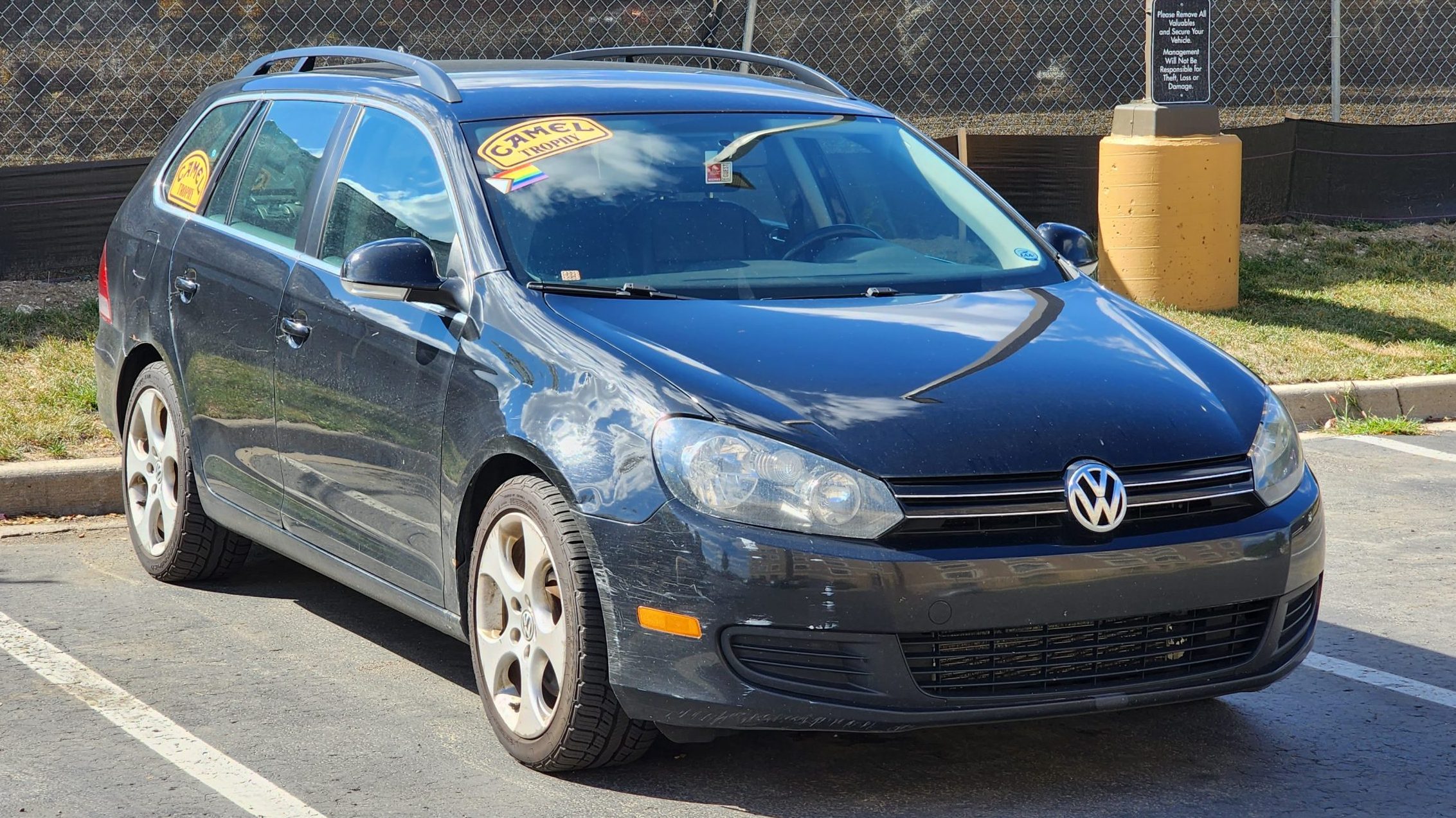
According to the United States Department Of Justice (DOJ), when Volkswagen settled its cases with the DOJ and the State of California, it was told to set aside $10.03 billion. That money was to be spent buying cars back from customers, terminating leases, and fixing the emissions systems of affected vehicles. From the DOJ:
Buyback option: Volkswagen must offer to buy back any affected 2.0 liter vehicle at their retail value as of September 2015 — just prior to the public disclosure of the emissions issue. Consumers who choose the buyback option will receive between $12,500 and $44,000, depending on their car’s model, year, mileage, and trim of the car, as well as the region of the country where it was purchased. In addition, because a straight buyback will not fully compensate consumers who owe more than their car is worth due to rapid depreciation, the FTC order provides these consumers with an option to have their loans forgiven by Volkswagen. Consumers who have third party loans have the option of having Volkswagen pay off those loans, up to 130 percent of the amount a consumer would be entitled to under the buyback (e.g., if the consumer is entitled to a $20,000 buyback, VW would pay off his/her loans up to a cap of $26,000).
EPA-approved modification to vehicle emissions system: The settlements also allow Volkswagen to apply to EPA and CARB for approval of an emissions modification on the affected vehicles, and, if approved, to offer consumers the option of keeping their cars and having them modified to comply with emissions standards. Under this option in accordance with the FTC order, consumers would also receive money from Volkswagen to redress the harm caused by VW’s deceptive advertising.
Consumers who leased the affected cars will have the option of terminating their leases (with no termination fee) or having their vehicles modified if a modification becomes available. In either case, under the FTC order, these consumers also will receive additional compensation from Volkswagen for the harm caused by VW’s deceptive advertising. Consumers who sold their TDI vehicles after the VW defeat device issue became public may be eligible for partial compensation, which will be split between them and the consumers who purchased the cars from them as set forth in the FTC order.

The recall and buyback process got insane at times. The EPA’s Consent Decree said that cars eligible for buybacks had to be “operable,” and many TDI owners tested the limits of that by stripping their cars down to only their most critical components before turning them in. During Dieselgate, prices for used TDIs fell. Some folks got clever and bought cheater diesels for cheap and then turned them in for the buyback, raking in thousands in profit in the process.
The chaos was something fascinating to watch. I remember seeing parking lots full of captured TDIs, just waiting to be fixed. Eventually, Volkswagen churned through the backlog, fixed the cheating diesels, and put them back on the market, complete with a great warranty. Despite the cheating and everything that happened, people rushed to buy the fixed diesels while they could. As I wrote in 2022, the buying frenzy was so crazy that some of the last TDIs ever assembled for the American market, the Volkswagen Touareg V6 TDI, were being listed for more than sticker price. In one case, I found a 2016 Volkswagen Touareg TDI for sale for $73,900, or nearly $24,000 over sticker.
A Decade Later
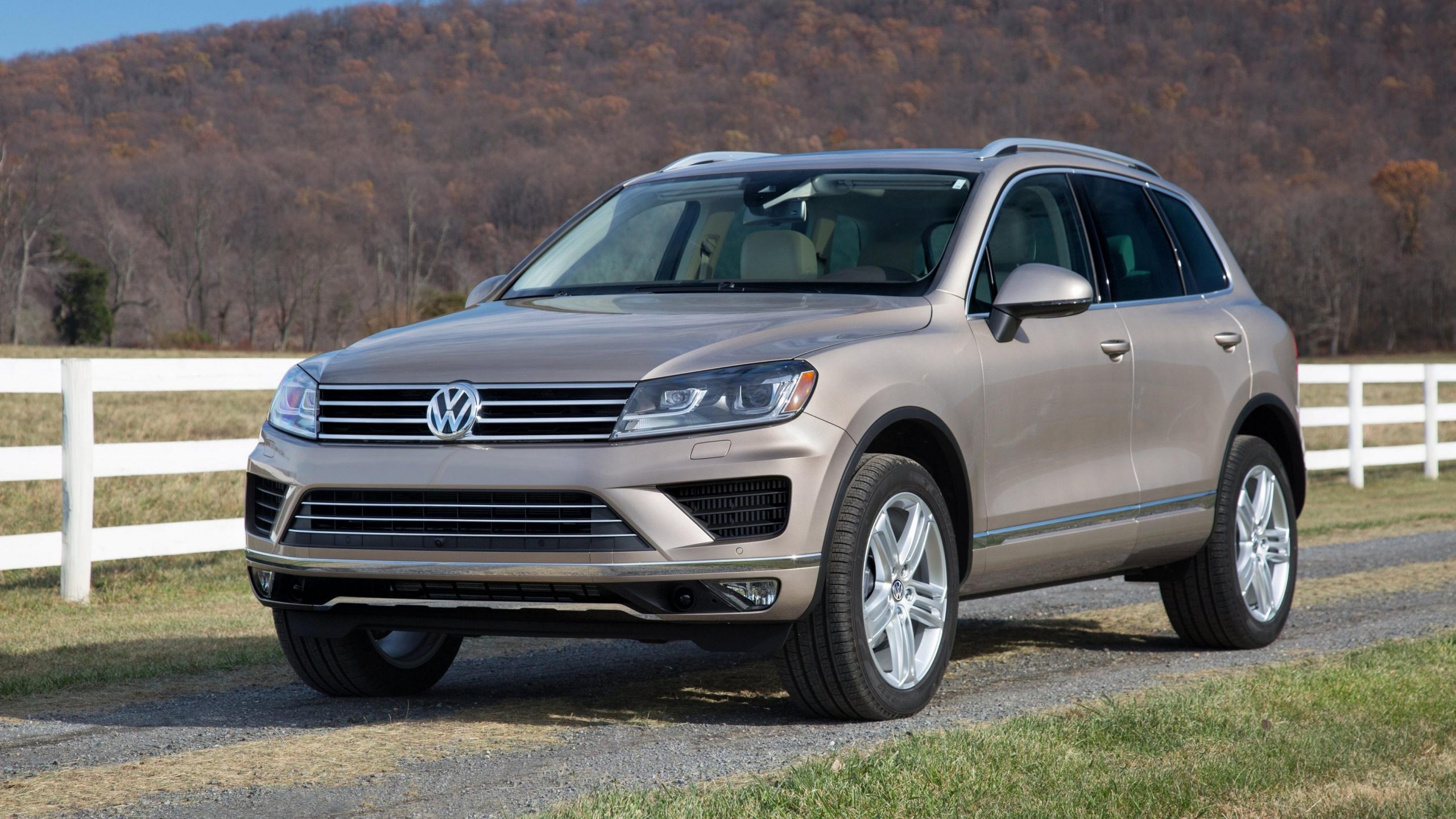
But the mad rush eventually ended. Everyone who wanted a TDI got one, and Volkswagen took its lickings. In the years since Dieselgate, diesel cars went from being the standard fuel for most passenger vehicles sold in Europe to being a niche with a low single-digit market share. Here in America, Volkswagen pulled diesel out of the market entirely, and save for one last gasp of compression ignition power thanks to General Motors, Mazda, and a few others, diesel cars are no longer sold here.
Today, Volkswagen TDIs no longer have mainstream appeal in America. Hybrids get the same fuel economy, and EVs now have green cred. I would argue that most TDI owners in America today are probably enthusiasts, or at least people who consciously like diesel. That wasn’t necessarily the case in the past, when Volkswagen pushed diesel as something to drive if you liked the environment.
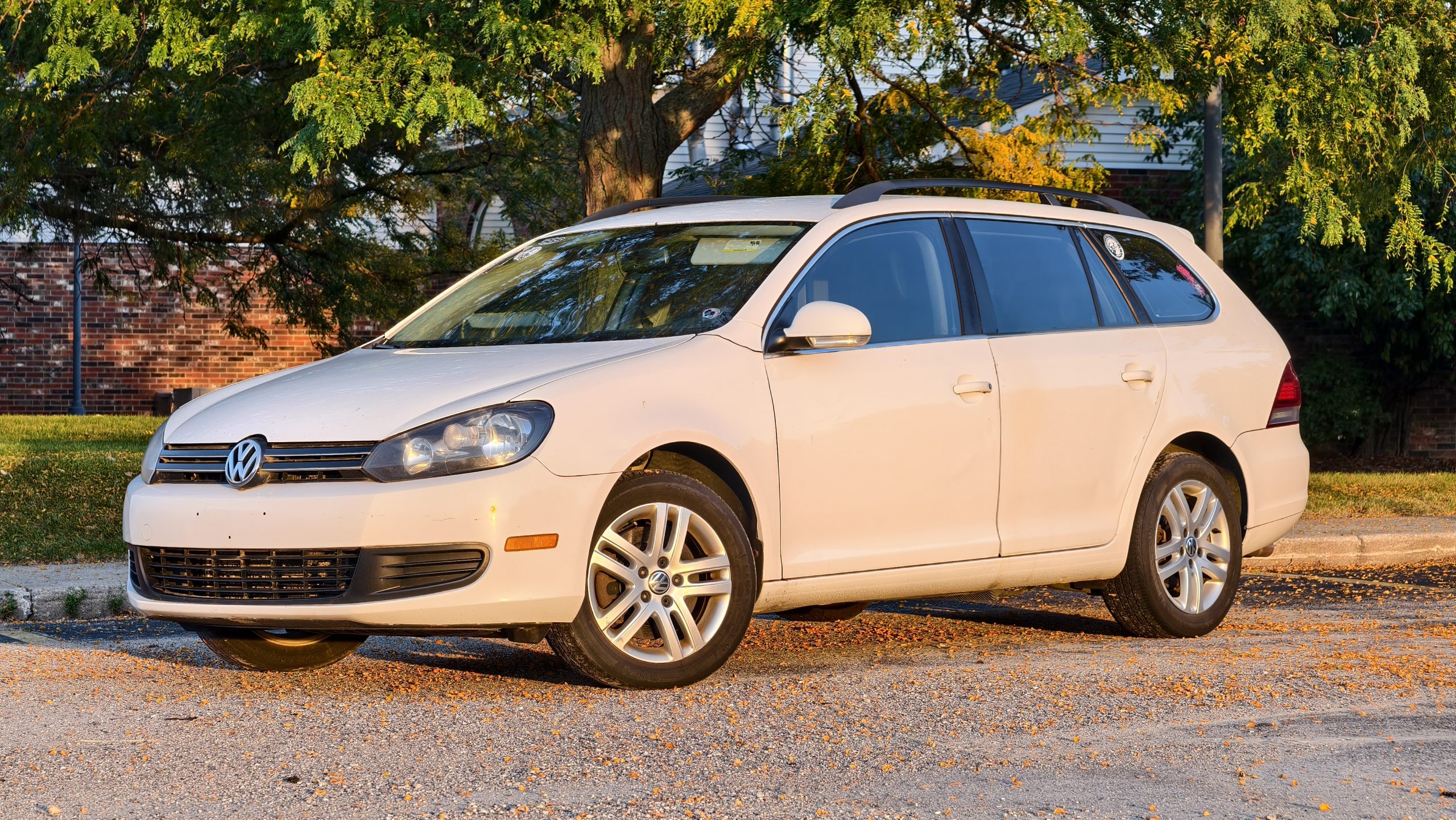
I bought my first cheater diesel in the summer of 2020. My car, a 2012 Volkswagen Jetta SportWagen TDI, was purchased new in Wisconsin. The first owner then hit the pavement, putting down some incredible miles. How many? When he took the car to get the Dieselgate fix in August 2018, the car already had a whopping 294,910 miles. For those of you doing the math, the original owner of my car drove it about 49,100 miles a year!
The cool thing about the Dieselgate extended warranty coverage is that it lasts for four years or 48,000 miles from the date of the fix. So far as I can tell, the original owner of my car gave the vehicle to an immediate family member in December 2019 when the vehicle had 340,000 miles. That person then drove the car about 12,000 miles before selling it to me in 2020. Technically, even though the car had been fixed for only two years, it had driven about 56,000 miles from the Dieselgate fix, and so it was no longer covered under the warranty. In my care, the car has lived a much gentler life, moving only about 3,000 miles. Granted, most of that is due to the nightmare I went through to get a title for the car.
So, what’s it like to own a Dieselgate-era car long after Volkswagen has moved on?
Peak Diesel Jetta

The Volkswagen Jetta SportWagen TDI technically has a weird history. The fifth-generation Jetta launched in 2005, and its design retained the general shape of the famous MkIV that came before, but rounded it out. Meanwhile, Volkswagen chased a more premium market with the interior. Volkswagen was big on technology with the MkV, and buyers were treated to features like optional dual-zone climate control, active head restraints, emergency brake assist, electric power steering, and Volkswagen’s Direct-Shift Gearbox (DSG) dual-clutch transmission. A previous story that I wrote continues:
The list of engines was pretty interesting, too. The base engine was a 2.5-liter inline five that made 150 HP. I like this engine because, with the right exhaust, it sounds like a baby Lamborghini. The aforementioned 1.9-liter diesel was still around and if you wanted Golf GTI power in a sedan body, you could opt for your Jetta to have a 2.0-liter turbocharged four making 200 HP. The Jetta GLI further offered some sporty bits like plaid seats, sport suspension, and sweet 17-inch wheels.

Now, things get sort of confusing with the wagon. At first, the MkV Jetta was sold only as a sedan, then Volkswagen teased the Jetta SportWagen in 2007. America would finally get the Jetta SportWagen in 2009. Here’s the fun part: Despite visual similarities and badging, the SportWagen technically isn’t just a long-roof Jetta. Instead, the Jetta SportWagen is actually a rebadged Golf wagon. Yes, the Jetta and the Golf are largely similar and ride on the same platform, but the Jetta was a little softer and a little more U.S.-centric than the Golf. But that’s the fun way Volkswagen decided to give the Jetta a wagon variant in America.
The body of the SportWagen remains seriously attractive even today. It doesn’t look angry, isn’t filled to the brim with creases, and looks just as good parked at a fancy resort as it does in front of a Walmart. Personally, I think these wagons look sharp with a set of ‘Detroit’ wheels. Unfortunately, the downside of these Jettas is that they love to rust. I used to own two of these SportWagens, and I sold my other one, which had 120,000 fewer miles, because rust had eaten away the tailgate, one door sill, and had been working a number on the rockers.

These particular vehicles were covered by a 12-year rust warranty, but in my experience, the warranty might not be honored unless the rust perforates the panel. Sadly, my 2012 is finally showing bad rust in one area, but it’s too late, as the warranty has now expired.
The interior of the SportWagen continues the sort of no-nonsense theme of the exterior. My car, which doesn’t have any of the Jetta SportWagen’s fancy features like real leather, a glass roof, dual-zone climate, navigation, or anything like that, is pretty comfortable inside. The seats are trimmed in perforated V-Tex leatherette, and the dashboard is of a somewhat soft-touch material.
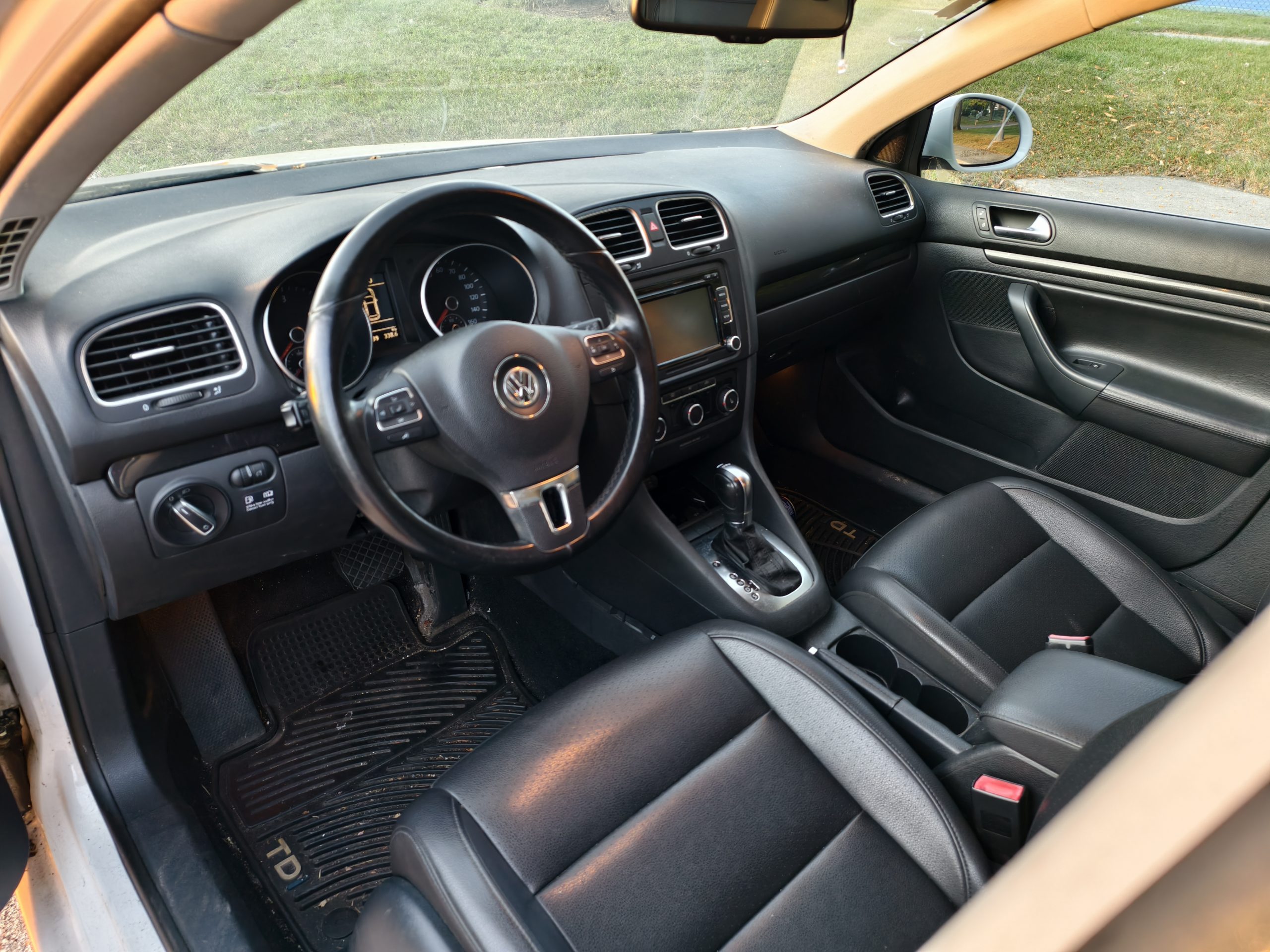
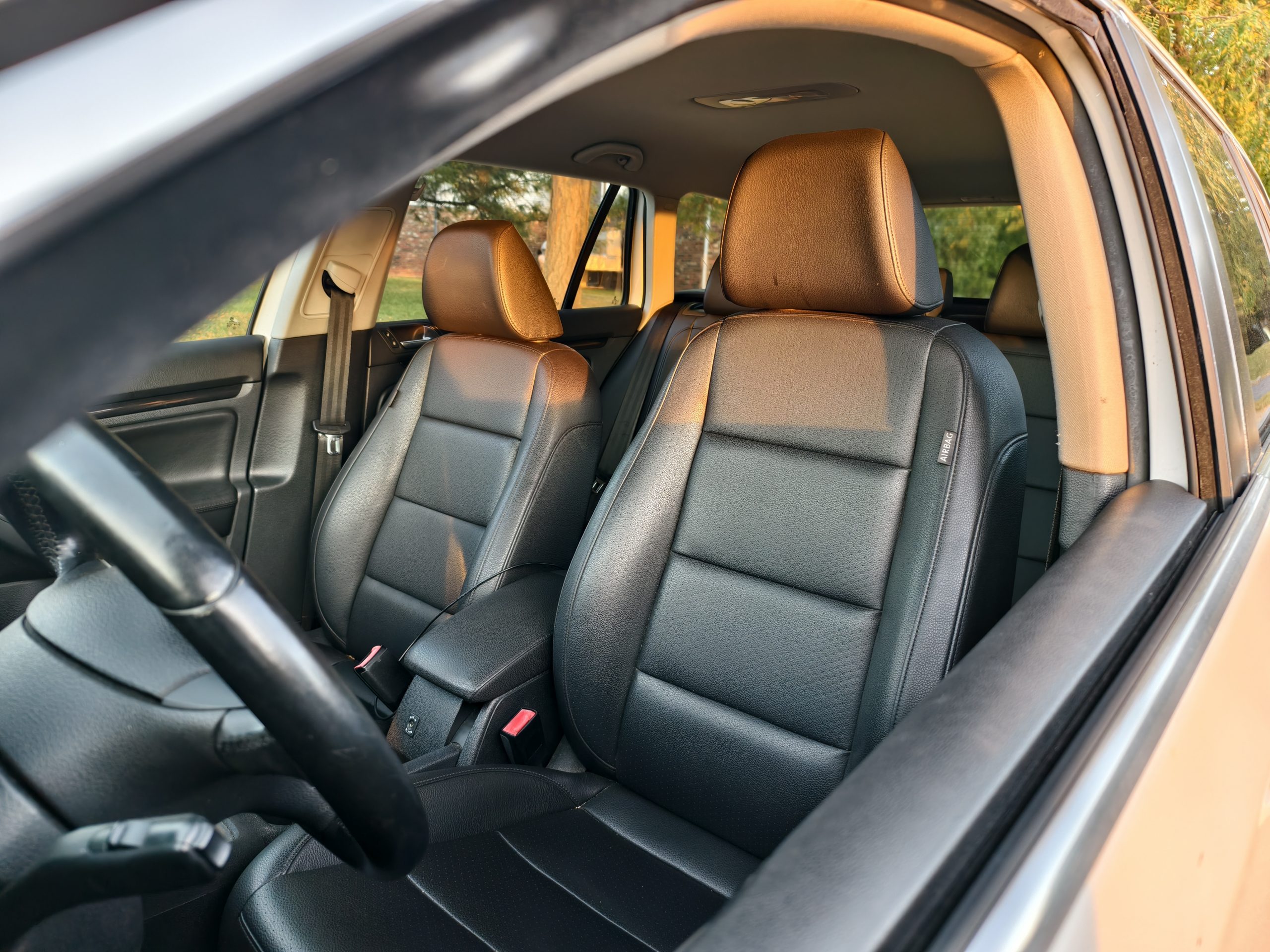
Either way, it feels pretty pleasing to the touch, even 13 years later. I have driven one of these diesel wagons non-stop from Chicago to Orlando and love the comfort of these seats. The passengers that I’ve carried also haven’t had any complaints.
Something I like is that there are just enough features to make the car feel modern, but not overdone. The front seats are heated, I can stream Bluetooth music through the stereo and its 10 speakers, and I could even rock SiriusXM Satellite Radio if that’s something I cared about. If that’s not enough for you, the SportWagen was also sold in a higher trim with the features that I mentioned above. However, for me, I’m okay with not having a glass roof as I don’t have to worry about the water leaks that are oh so common with aged German cars.
The Goods
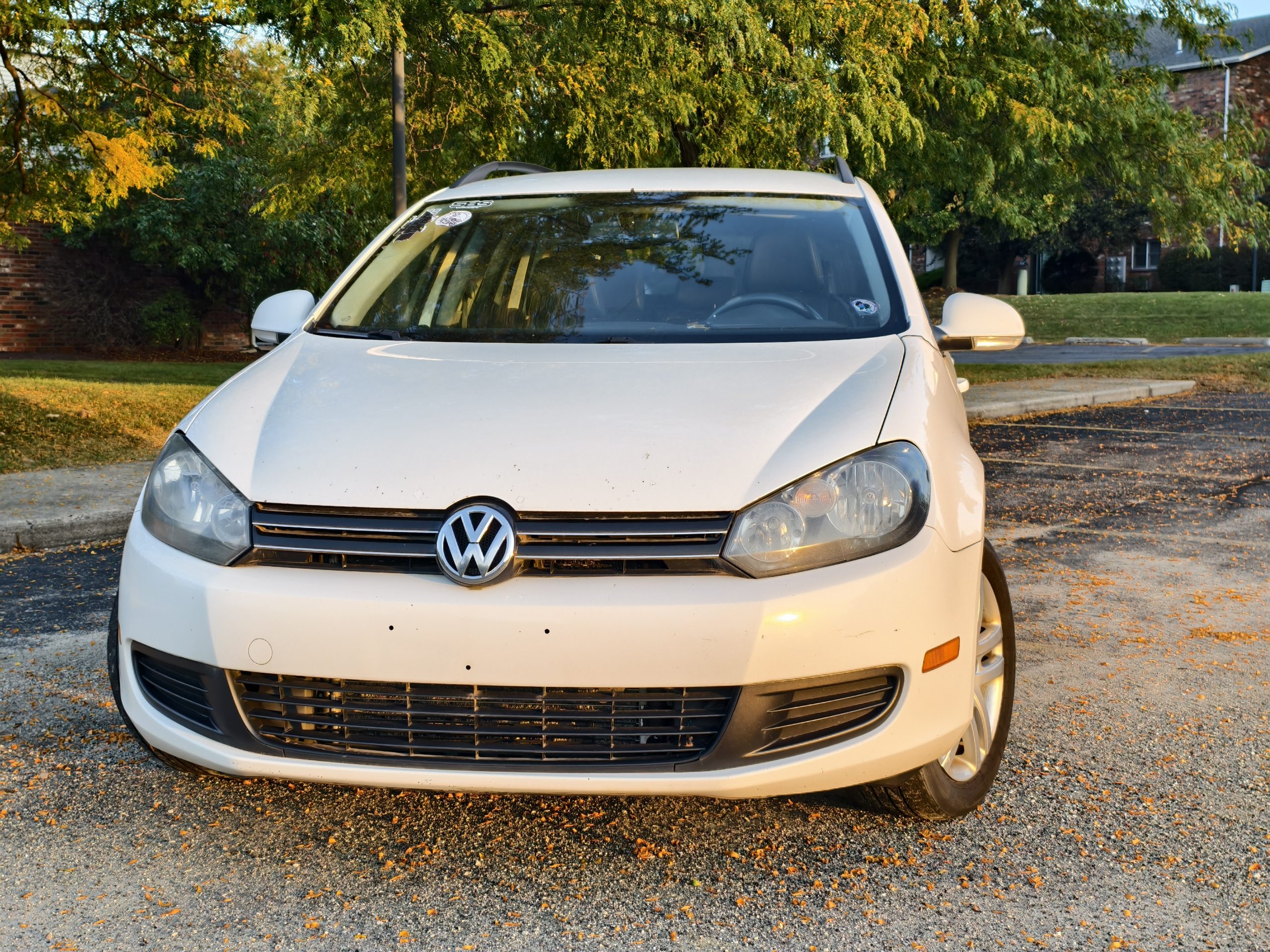
Under the hood sits a 2.0-liter CJAA common rail four-cylinder turbodiesel engine. This mill makes 140 horsepower and 236 lb-ft of torque, which is transmitted through either a six-speed manual, or a six-speed DSG. Volkswagen said that with the diesel engine, SportWagen owners got up to 39 mpg highway with the DSG and 42 mpg highway with the six-speed manual.
The only other engine choice for most of the SportWagen’s run was the 2.5-liter straight-five, which was good for 170 horsepower and 177 lb-ft of torque, and sounds like half of a Lamborghini. For just a single year, 2009, there was also the Volkswagen Jetta SportWagen SEL 2.0T, which packaged the SportWagen with the 2.0-liter 200 HP turbocharged four from the Golf GTI. That year, Volkswagen had reported that 81 percent of SportWagen sales went to the diesel model. Technically, this is one of those weird situations where the gas model is the rarer version.
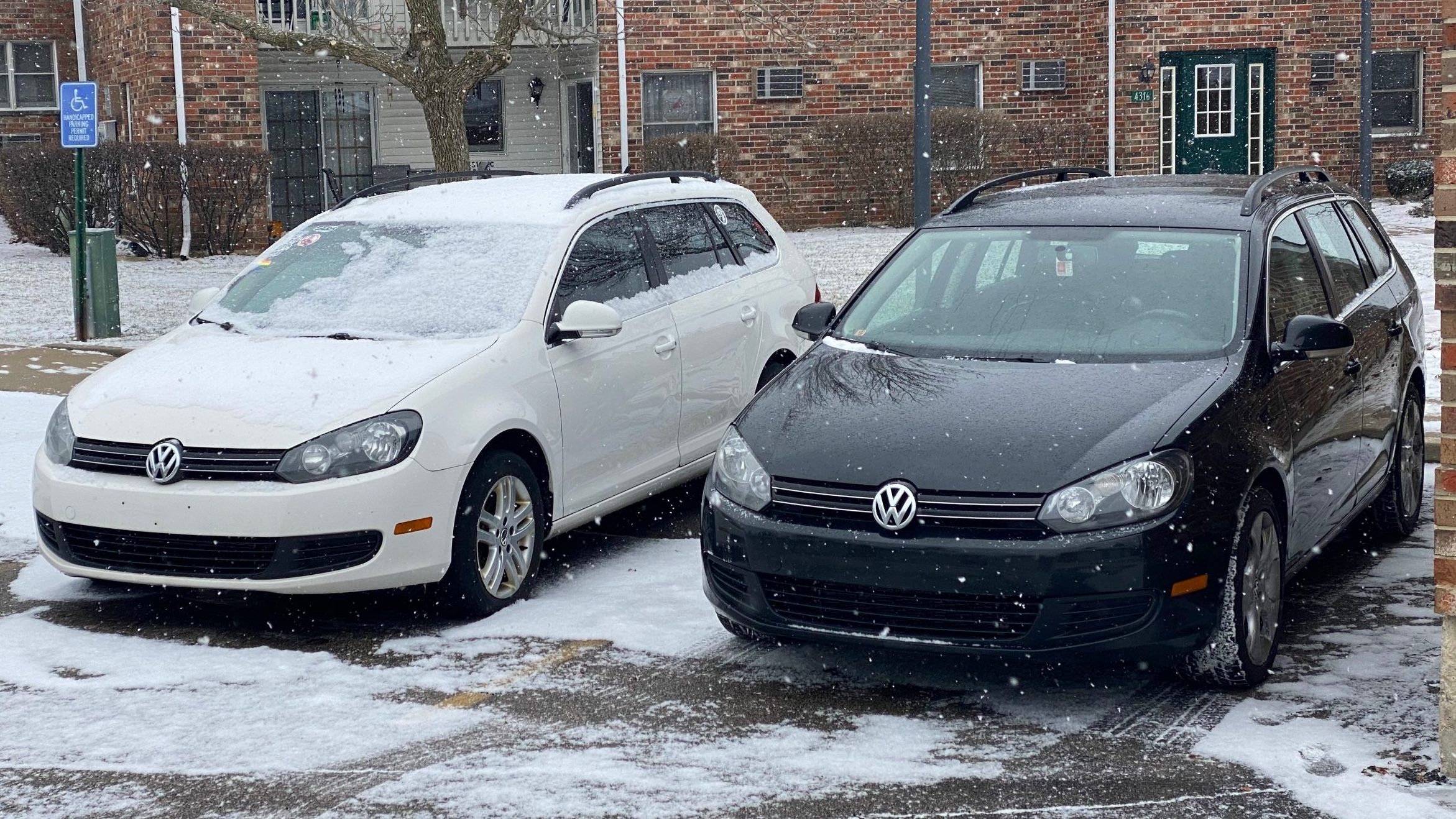
Because I’m weird, I owned both a DSG model (white) and a six-speed manual (black) version at the same time. Both cars even had the exact same options, but the six-speed had slightly larger 17-inch wheels as opposed to the 16-inch wheels found on the DSG model.
On the road, both of these cars are great to drive. Their suspensions, MacPherson struts up front and a multi-link setup in the rear, are just firm enough to handle the car through turns, but not so harsh that I can’t enjoy a long trip. Body roll is present, but well-controlled and, even in my two high-mile examples, remains composed even when sending the car through twisty and destroyed roads in the Midwest. Like most front-wheel-drive cars, the limits are pretty predictable, too, and getting too excited is met with understeer. I bet with the right tires and a sporty suspension upgrade, you can turn one of these wagons into a sort of discount diesel GTI. Okay, maybe if you squint a bit.
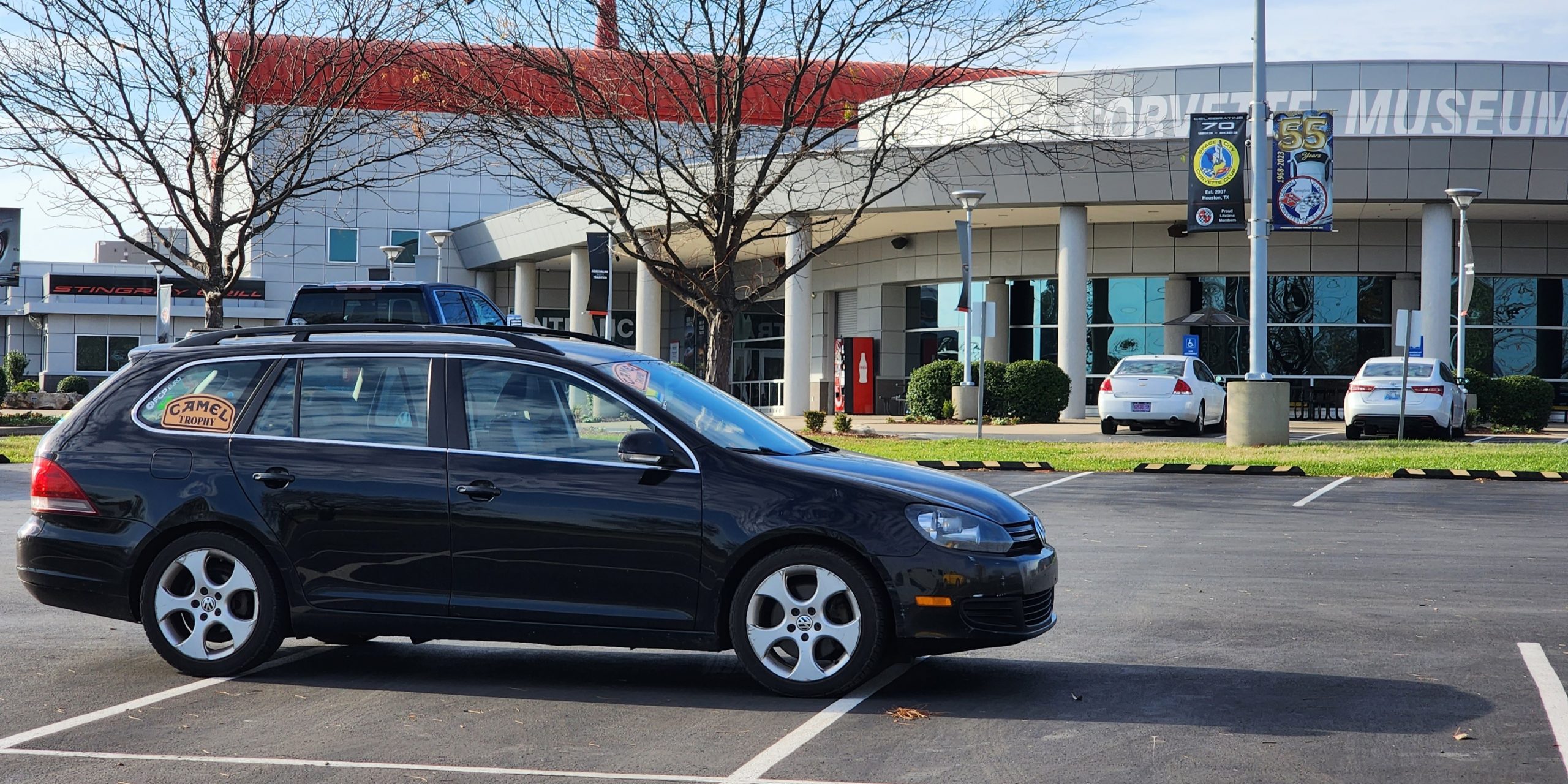
When I don’t send the SportWagen through curves, I find that these wagons are pretty quiet. Now, these aren’t luxury cars, so don’t expect a library. Tire noise is what I associate the most with the interiors of these vehicles. But it’s not too bad. Again, I’ve driven these far and wide without stopping and have felt pretty good upon arrival.
The diesel complements the experience. At launch, the low-down torque is more than enough to break the tires loose, which makes me giggle because I’m a hooligan at heart. This doesn’t necessarily translate to speed. In MotorWeek‘s hands, the SportWagen TDI hit 60 mph in 8.9 seconds. That’s quick for a diesel, but slower than many more sporty cars. Check out the review:
Transmission choice makes a pretty big difference. The six-speed DSG is lightning quick, buttery smooth, and effortlessly chooses the right gear for most situations, but not at all engaging. I found the manual to be much more fun to drive. However, the manual in mine, or at least in my 230,000-mile example, wasn’t particularly impressive. It was accurate, sure, but not very clicky, and it didn’t have as much feel as I like to have in my shifters. Again, this car was pretty old, so some of that was absolutely due to wear.
Both of my cars managed to get similar fuel economy, with both scoring between 42 mpg and 45 mpg, depending on driving conditions. Do the math, and that’s over 600 miles on a single tank of diesel, and you bet that I challenged myself to drive that distance without stopping.
Diesel Emissions
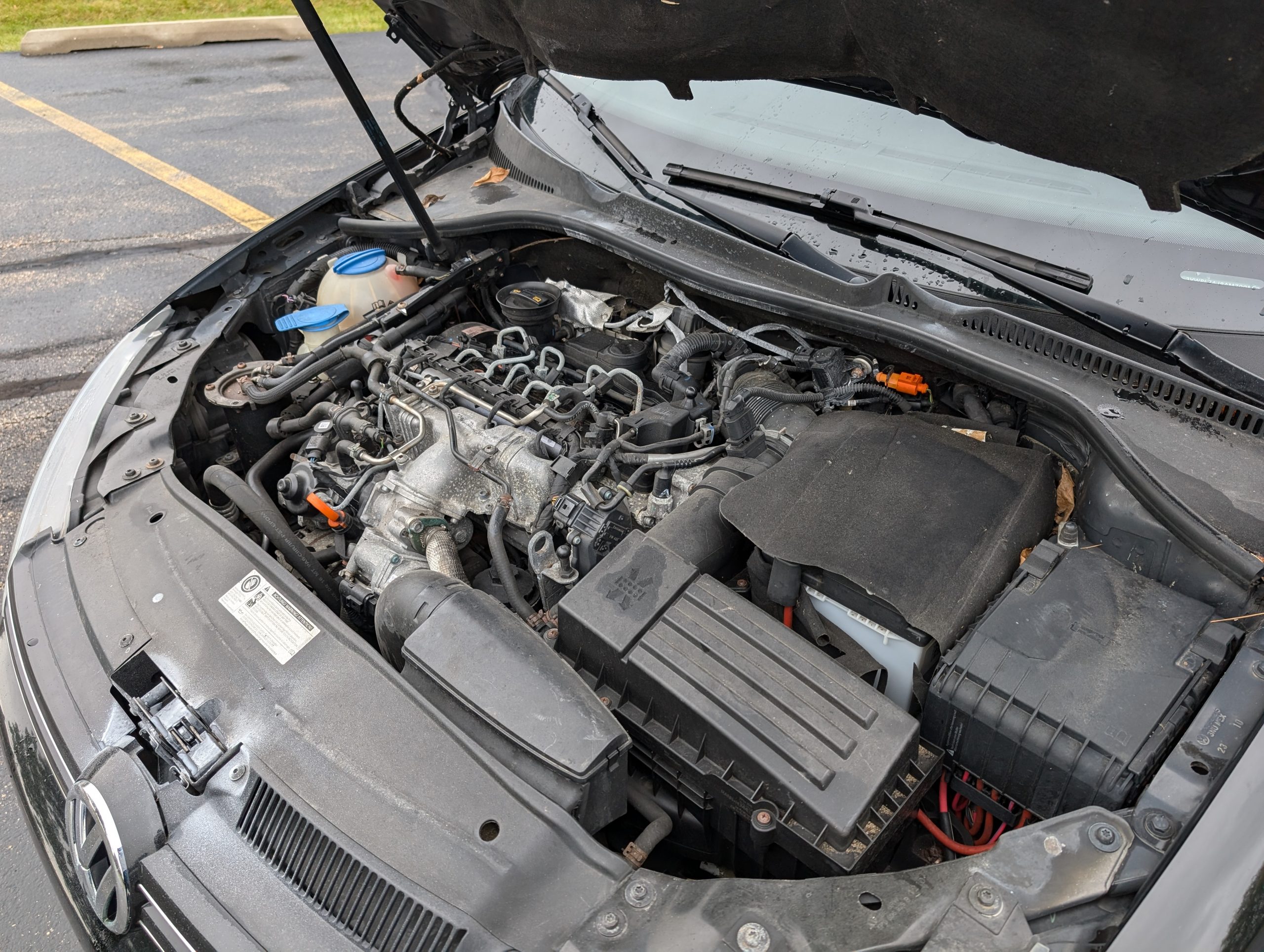
The powertrains of my two examples also suffered from a couple of interesting problems. My 2010 example, which had the six-speed manual, more rust, and 230,000 miles, suffered from a cracked diesel particulate filter (DPF). Essentially, the honeycomb structure within the DPF cracks and sends soot through. A common issue that occurs after DPF failure is the clogging of the EGR cooler. Ultimately, so much soot can get through that your tailpipe will turn black, and your car might even belch some smoke on acceleration. That’s what my 2010 SportWagen did after its DPFs cracked. In many cases, the car will actually drive ok after a DPF crack, and at least early on, your only indication might be an illuminated check engine light and codes for insufficient EGR flow. In my case, my fuel economy also went down to about 40 mpg.
There is an unconfirmed theory that since the emissions fix causes the car to actually utilize its emissions equipment as it should, this equipment is now more prone to failure in fixed vehicles. There are forum threads of enthusiasts tracking emissions equipment failures, and it does seem that there could be a kernel of truth to the theory. I suppose it does make sense, since before the Dieselgate fix, the cars were allowed to pollute more than they should have.

My 2010 also had a turbo boost problem that I wasn’t able to figure out. At speeds of between 73 mph and 83 mph, the car sometimes went into limp mode due to underboost. My car’s turbo actuator arm was corroding, so that could have been the issue. The car also could have had a vacuum leak. I sold it before I diagnosed the exact cause.
On the other hand, the 2012’s emissions equipment and turbo have been flawless despite so many more miles. The service records that I have even suggest that it hasn’t been to the dealer for an emissions problem after the Dieselgate fix. I haven’t seen its check engine light illuminated when driving. Instead, the problem that this car had was that its timing belt was actively cracking, and the dual-mass flywheel was failing. I had a new timing belt, dual-mass flywheel, and water pump fitted and haven’t had a problem since. The one issue that the car is suffering from right now, aside from bald tires, is a right front wheel bearing that has only just started to make noise.
Peak Volkswagen
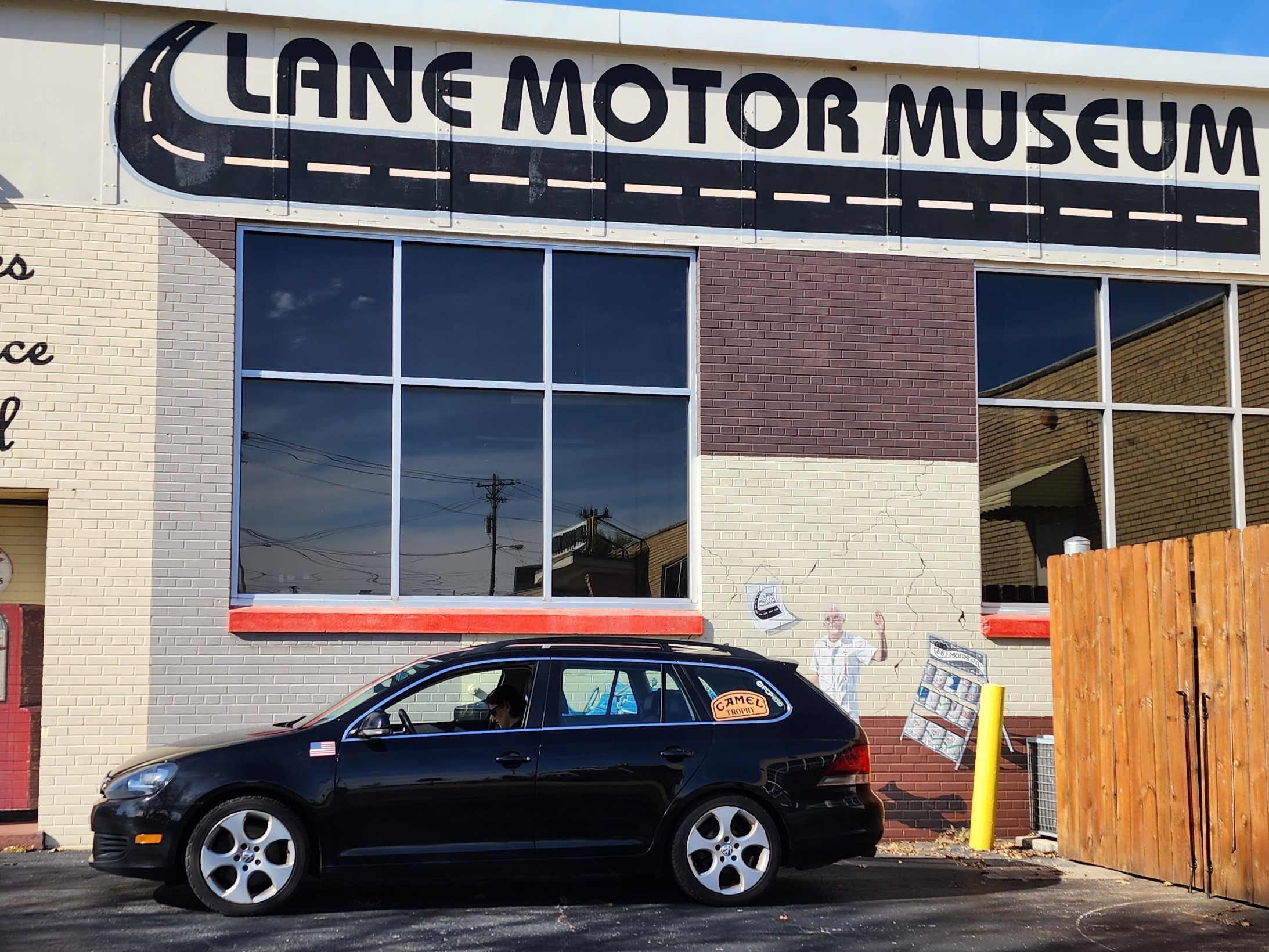
In a way, these SportWagen TDIs, and their newer Golf SportWagen TDI counterparts, represented the peak of the Dieselgate era. My car was built before Volkswagen started adding diesel exhaust fluid systems, and it was made right there in that time when Volkswagen really pushed “TDI Clean Diesel” to surprising success. For a moment in time, diesels made up nearly a quarter of Volkswagen of America’s sales, and Volkswagen was enjoying the spoils so much that other automakers tried to get in on the market. I still wonder if Mazda, which spent nearly a decade trying to perfect a diesel for America, knew that Volkswagen wasn’t playing with a fair deck.
I suppose that makes this car sort of bittersweet. The SportWagen was made at a time when diesel was still seen as great, and when Volkswagen took the credit for making diesel “clean.” They were fun cars that you could enjoy without guilt. People absolutely adored these cars, and for good reason. What’s more peak Volkswagen than making a manual diesel wagon that you could buy in the color brown?
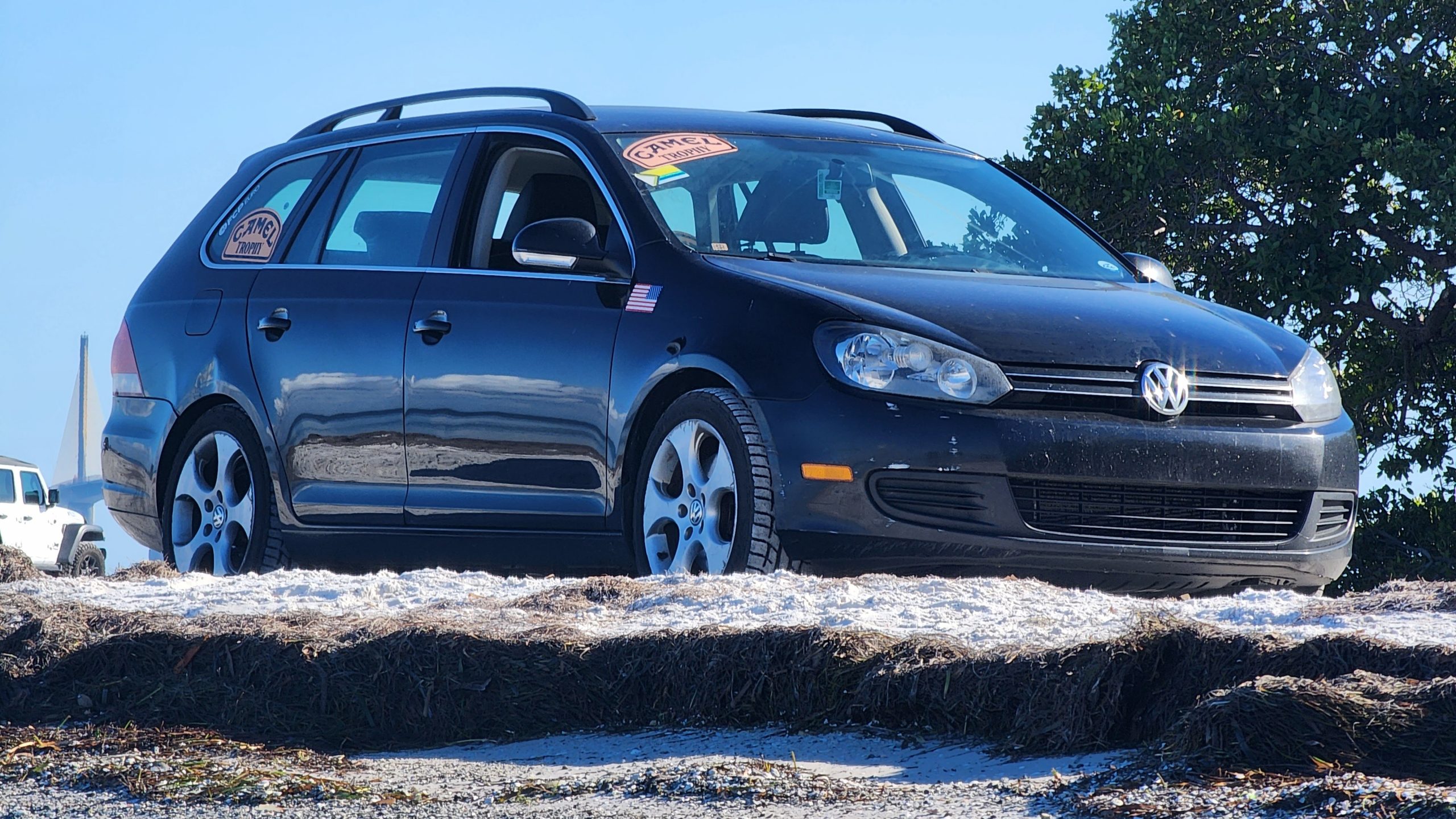
Yet, at the same time, these cars now represent one of Volkswagen’s dark eras, one where it lied to the public about a subject as serious as harmful emissions. The fixed diesels drive just fine and don’t pollute like they used to, and people still love them. But they’re now tainted–possibly forever–by Dieselgate. Volkswagen, as well as much of the world, has turned away from diesel and has moved on to EVs. My SportWagen is now a dinosaur from another time.
If you’re a fan of diesel and the weight of Dieselgate isn’t stopping you, I’d still recommend buying one of these cars. They’re still great all of these years later. They regularly get more than 40 mpg, and they can still be reliable. Volkswagen TDI fans are still driving and modding them, too. Just make sure you buy one from a place that doesn’t know what rust is.
All photo: Mercedes Streeter

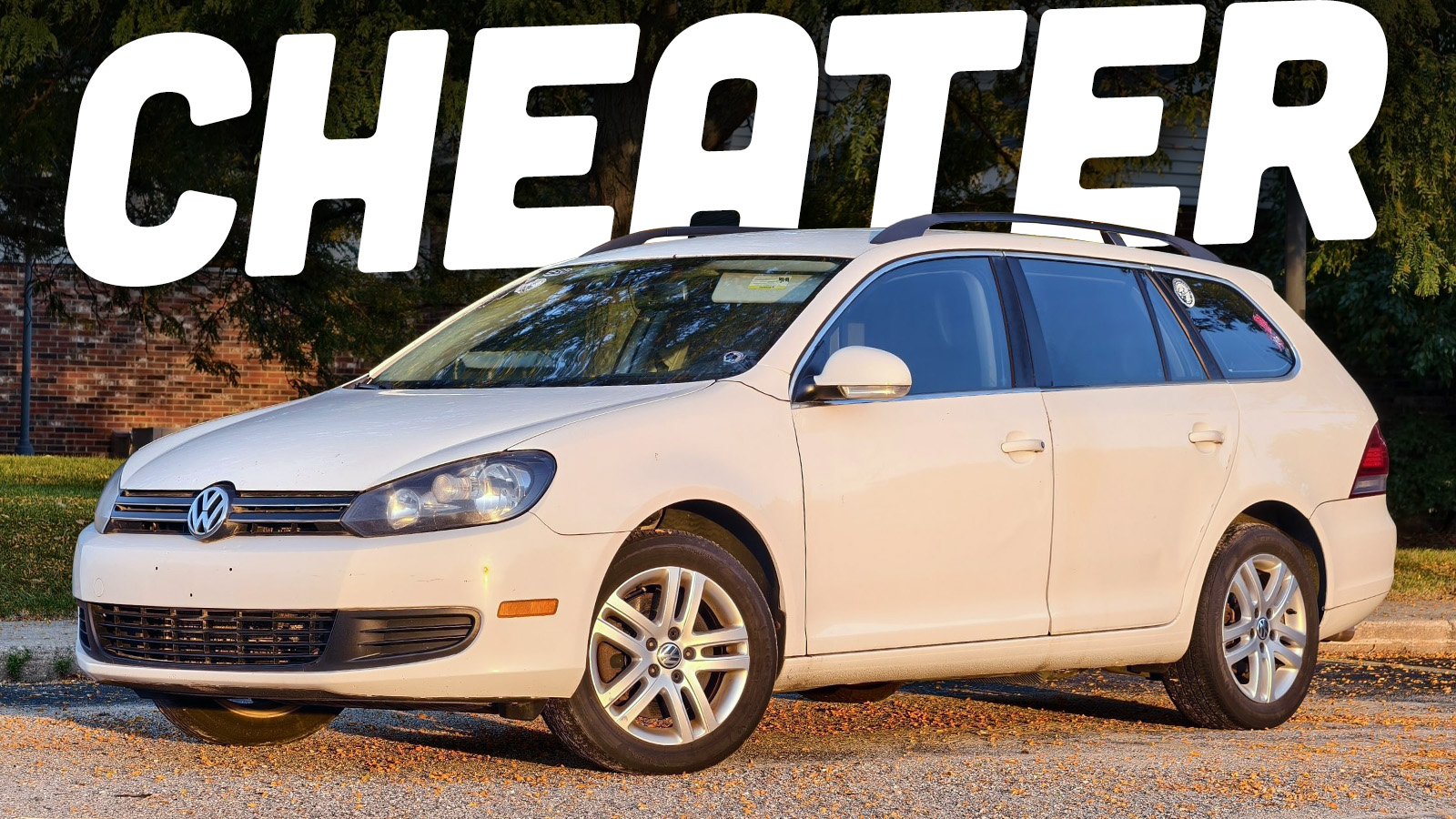







Exhaust recirc valve is upstream of DPF
Go through incredible technical hurdles to make your vehicle somewhat clean and on par (if that) with other automotive power trains, or cheat. Or looking at the advent of EVs and hybrids, ditch the technology except for narrow case uses.
I had a 2012 Passat TDI SE w/ sunroof and nav. Black on black. PAid a little over $28k if I recall and received around $21-$22k back after putting 75k+ miles on it. Probably the cheapest cost of ownership. Had a few issues, some of which eventually became recall issues and I was reimbursed by VW.
What was the mileage hit that these car took with the correct emissions systems. I remember a friend of mine selling his because it didn’t get the great mileage any more!
Yep. My neighbor had one bought new, probably like a year before the whole cheating thing came out. It was a Jetta sedan with an auto. It routinely cracked 50mpg on highway trips and was a really nice car to drive. Gobs of low end torque, so it really felt punchy in normal driving. We took trips out to her rental property from upstate NY out to Cape Cod a few times a year, so I ended up spending a fair amount of time in and driving that car. It was by far the best auto trans I’d tried in any car. Snappy and responsive.
She resisted having the recall done for a while, then started getting the letters offering a buyback. The offers were pretty low, so eventually brought it in to have the “fix” done. Immediately the car….sucked more. It was notably less powerful and it lost a solid 10MPG on average. After the fix it was lucky to crack 40 highway. Which I mean, is still pretty good, but then coupled with the notable decrease in engine performance, the whole point of the car was sort of lost and she traded it in shortly after. At that point, just get a gas hybrid, and save a buck a gallon on the fuel.
Based on what I’ve heard (sadly, I have not driven a pre-fix Dieselgate car), pre-fix cars could routinely hit 50 mpg!
Had a 2013 6MT TDI. Was great, but of course, I let VW shovel money into my bank account. Only ‘regret’ was being hasty and buying a 2016 GTI, when I should’ve waited a couple months for the first Golf SportWagon Alltracks to be available.
I had a 2010 Jetta TDi for 3 years. Bought it used in 2014 or so with 36,000 ish miles on it, looked perfect. Drove it for 3 years, and regularly saw mileage just crack 50 MPG on long interstate drives with the DSG. It was the best small sedan I have ever driven and I do miss it from time to time. Unless it was really cold out, you really couldn’t tell it was a diesel except at idle, and you had to be standing right next to the engine compartment. After I sold it back to VW for Dieselgate, I looked at a Jag with the Ingenium 2.0 diesel. It sounded about like my dad’s John Deere, and the 8 speed ZF automatic shifted like crap, so I rolled my buyout money into a new Golf R.
By the way, what was the fix for the emissions system that allowed the 2.0 TDI cars to get back on the road?
I do believe one of my colleagues is writing a story about the history of Dieselgate, including the fixes. 🙂
Thanks! I watched the Netflix documentary on Dieselgate, and I googled my question, I asked a couple of LLMs, and I still have no idea what the answer is. Most other manufacturers need AdBlue/DEF to comply with emissions, so I don’t understand how the 2.0 TDI didn’t need DEF to become compliant.
It would be great to get the answer soon. Next weekend we are going to 24 Hours of Lemons, and our theme is Dieselgate-related.
You are on the right track. VW TDIs without DEF were bought back and scrapped without fix.
The newer TDIs with DEF were reprogrammed to meet emissions all the time, not just for about 20 minutes when conditions are right to cheat on the EPA test.
So after fix it used more DEF, diesel and emission parts were wearing out faster.
VW was cheating emissions test to:
1. to save $18/car (or whatever VW’s cost is for DEF at the factory) by not installing DEF.
Two (David’s broken website corrects my 2 into 1 again). To advertise to customers that they only need to add DEF at oil change (every 10,000 miles or 12 months). To save them some money
Three. To save on warranty repairs of emissions system
Four. To be more competitive in the segment (no DEF needed vs other diesel engines)
This is not correct. Lots and lots full of 2010-2013 cars were ‘fixed’. It was I think mostly a software fix that made them actually comply with the standards they were supposed to meet, which did not require DEF.
They invested billions in designing a better cheating engine.
Oh oh can you ask them to include International (formally Navistar) also being caught lying about diesel emissions are the same time. It is kind of funny because they are owned by VW now also (well Traton)
I’m sure the article will be more complete – but gist is software changes to make the EGR system run in ” inspection mode” all the time along with other changes, a new larger catalytic converter and I believe a new style of EGR filter but that might have come later.
I have actually looked into getting a TDI VW in the past but with the price of diesel how it is now and dealing with DPF systems has kind of steered me away same with DEF systems on new diesels just to many complex expensive systems to break.
Without ever bothering to look up how it works, I’ve always wondered why the DEF couldn’t just be mixed in with the fuel at the refinery.
DEF is injected in after combustion so into the exhaust. The trucks I work on you have two dosers one right at the turbo outlet and then one at the further down the exhaust system at the giant aftertreatment box. I had to check dosing rates on a developmental truck the other day was oh so much fun haha
Edit note essentially the DEF is injected into the exhaust to get rid of as much NOx emissions as possible and if it was mixed with fuel you would just be burning off the def instead of it chemically reacting with the exhaust to get rid of NOx. I am not a chemist or even titled as an engineer at my job (even though everyone thinks I am an engineer and do engineer work) so I am sure there are others here that can give a more indepth answer.
Same. I’ve wanted a 6-speed TDi Sportwagen for years, but I really hesitate to pull the trigger. I’d be tempted if I could snag a cheap, “unfixed” one, but then I’d have a little lingering guilt about the emissions. I wonder if an un-repaired one would pass emissions up in our neck of the woods (northwest Indiana, which I think I recall you saying you lived here too)
If I am not mistaken I think you can get an exemption for diesels in Indiana (well I mean only Lake and Porter county since those are the only 2 that require it due to Chicago and the EPA) I have never had to file for an exemption for my 92 cummins but for my 89 firebird I have to file for the show/classic car exemption. According to the clean air check website (website for Indiana emissions) it says you can file for said diesel exemption.
THose were not forced to be compliant with emissions like TDIs were. Maybe they are just old and broken so they cannot pass emission tests anymore,
I don’t think they will let you register TDIs that were not bought back or fixed if they had a fix for it.
AFAIK the fix was optional. I have a few friends who own TDi vehicles that never brought them in to have the fix done. My own parents as well own a 3.0 TDi Touareg, and did not have it “repaired” that I know of.
Granted, these are also people that live in areas where emissions testing isn’t done, so it might be required in some states.
I’ve never liked the smell of burning diesel, so I’d never buy a car running on it.
I do wonder why Diesel Hybrids isn’t a major thing. Cost, I’m guessing.
Something that you might like about a modern diesel is that, due to the aftertreatment, the “diesel” smell isn’t really there anymore. I can’t really describe what the smell is now, but definitely not diesel-y, especially in diesels with DEF systems.
They smell like piss. The active ingredient is urea, so modern diesels smell like burnt piss. That is why I like that my boss buys tall stacks instead of weed burners on his trucks. Can’t smell it as bad that way.
I’ve got a Colorado with the 2.8l Duramax and have never once experienced it smelling like ‘burnt piss’.
Might be a volume thing. My semi goes through 5 gallons a day.
I can smell every diesel on the road. They are easy to ID by black smoke coming out. It still smells. Smells less, but smells.
I can still smell it.
Just like I can smell even the faintest whiff of cigarette smoke.
Mostly, because I hate those scents.
Might be a DNA thing. I also taste soap in cilantro, but it doesn’t stop me from eating it. (Maybe I cursed a lot as a child?)
It is! Just not in the US. A few years ago when we were on vacation in Andalucia, our rental was a Hyundai Tucson with a diesel hybrid and a 6-speed manual. Got about 40mpg.
I bought a 2011 with about 40k miles on it, and thought I got it for a song. It was my first diesel, loved that it was a wagon, loved that it was a manual, the roof, all the space but still being low to the ground, the mileage, the low end torque, pretty much everything about it. 6 years and 130k mile down the road, I probably only love it slightly more than I hate it. This car has cost me more grief than any other car I’ve ever owned. I think the issue is that every good thing comes with an equally bad thing to counter it.
It’s a Texas car, so no rust! But the upholstry glue is so crap that the heat has made pretty much every panel start to pull away from the doors
The transmission is great! But I also had flywheel issues that basically killed the whole thing and I had to put a new one in at a cost of a zillion dollars
The suspension rides wonderfully! But it’s also made of Swiss cheese (I guess technically Emmentaler), so I’ve had to replace pretty much all of it way sooner than I thought I would have to. Coming out one morning at around 70k miles to a rear spring just having broken for no reason was the first sign
The pano roof is awesome! Hey why is my spare tire compartment a swimming pool?
But hey, that sun screen on the roof is still pretty cool! Except again, crap glue, and it spent a month rubbing against the top of my head and it stopped the panel from retracting.
But it’s quick, tyhanks to that loew end torque and the great turbo! Sure, right up until the garbage oil feed line breaks and starves the turbo, and you end up having to replace it. At least the turbo grenading was neat
But hey, what about that gas mileage? Well, once the DPF cracked and I was quoted about 4k to fix it, you can probably guess
Yeah. There’s more, like the idea that VW thought it was reasonable to require you to remove pretty much the entire front end to replace a simple thing like the thermostat, the fact that the super comfy front seat now looks like cracked elephant hide, and lots of other little things.
And yet, somehow I still really like driving it. Im probably going to have this at least until 300k miles, and it’ll do it. It’s at about 170k miles and drives fantastically, with a new turbo, a tune, far less emmisions equipment, and a couple of other fun mods. Once I did as much to un-VW the car as I could, it’s pretty fantastic. It took a solid year of hating and cursing this thing to finally get it to a point I could love it again.
So yeah maybe don’t buy one of these. But if you do, give me a call and I’ll talk you through everything you need to know.
Ah, the “fun” of German car ownership. But I am curious about this:
What behavior did your flywheel exhibit? Mine was making a very loud chatter for about 1,000 miles before I had it replaced. I was warned that, if I waited too long, it could fail and destroy the transmission.
If I recall correctly, the dealer quoted me something like $2,500 for just the flywheel replacement, and I don’t remember if that included the part. I ended up paying somewhere around $2,000 total for a new flywheel, a new water pump, a new timing belt, and labor at my indy. I cannot ever move because holy crap, he has some dirt-cheap labor.
Admittedly, I never fixed my cracked DPF problem in the black car. Fuel economy dropped to 40 mpg, and it drove the same, but it had a perpetual CEL and lots and lots of soot. When I sold it, the new owner suggested that the DPF was no longer going to be a factor.
Almost none suprisingly. I started to get a little bit of a wobbly feeling that I felt through the clutch pedal, and that was maybe for a day. Drove to work and could feel it, drove home still felt it, drove to work the next day, and on the drive home it just went. It almost had a winding up or spinning sound. Depress the clutch, sound goes away, let the clutch out, sound comes back. I had a solid day of that sound, drove at most 40 miles with it, and then shifting from 2nd to 3rd on my way home, it just wouldn’t go into gear. Once I pulled the gearbox to see what was going on, pretty much all of it was in pieces, it even cracked a hole into the transmission housing. I ended up buying a used transmission, new clutch, new flywheel and put it all back together. Kind of a nightmare, and not a cheap nightmare either. Getting it replaced at a decent shop (there’s a VW Audi shop here called ‘Lord of the Rings’ that’s pretty great) was going to cost about 6k, which put it well out of my budget. But hey, I learned something new.
I think my thermostat going out was what got my DPF so early. The thermostats on these fail in the they stay open, rather than closing and overheating the car. Which on a petrol car would probably be fine, but on a diesel car that needs to get to a certain temp to trigger a regen, it’s pretty fatal. I didn’t know this at the time, and in taking a while to fix it, I think it kept the car from going into regen and took out the DPF way sooner. The cheapest quote I got to replace it was just under 4k, so that was never going to happen. I think I paid about $600 for everything to remove and replace, plus the tune, and now it’s a ‘never worry about it’ problem. Texas doesn’t test emmisions on diesel vehicles, so while I couldn’t register the car in California, I’m fine where it is.
Honestly one of the things I’ve actually enjoyed about the car is all the things I’ve had to learn as a result. That may sound sarcastic, but it’s actually been rewarding to learn as much as I have, and it’s made dealing with the usual VW pains a lot better
The exhaust temperatures need to be higher for DPF regeneration, not coolant.
It can make exhaust temperature higher by controlling fuel injectors.
My friend did these regenerations at idle when parked. It just makes a lot of gray smoke
Really? A number of people convinced me that you had to have the engine temp up to get the car to regen. Makes sense that it’s the exhaust, but I guess I was mislead about the engine temp
Interesting
Low coolant temperatures can also prevent a regen – at least they can on my 2011 Duramax. That engine has 2 thermostats and it took the dealer 12 hours to replace them as opposed to the 4 hours of book time. (I watched as I was stuck in the middle of Missouri)
Was the driver’s seat (the one in the light/white coloured vehicle) replaced/refurbished in some way?
It looks amazing for a car that’s got 300k miles on the clock.
Not pictured are about two cracks in the lower bolster that I repaired a couple of years ago. My service records suggest that the interior is entirely original!
I adore my manual 2004 (pre-cheater) TDI wagon so much that at 250K miles, I sometimes pay for routine maintenance (timing belt, brakes, etc.) that exceed the value of the car. But no worries. I’ll keep it going. I bought it new, hauled kids for the first decade and everything else for the second decade. It purrs like a kitten and sips fuel like a miser. With a Yakima roof basket and the seats folded down, it is my truck, my do-everything mule, and I won’t hesitate to take it on road trips, dump runs, etc.
But I do most of that alone; my wife says it smells too musty, with traces of dog, spilled kids drinks, and vomit. She’s right, of course.
See to me that MK4 era is peak VW, I would be doing exactly the same thing in your shoes
https://www.amazon.com/Generator-Industrial-Purifier-Deodorizer-Square/dp/B0CYCL5T9F
As long as you clean up the obvious stuff, you’d be amazed by what one of those can do
I had 2 MK4s, one was totaled and the other I sold to get get the current car I have now. I still miss that 2001, that thing had almost 200k with no problems, it was wonderful.
My 2010 TDI wagon with the six-speed manual is the best daily driver I ever owned—economical, practical, and still engaging to drive. I let VW buy it back to my undying regret.
How to I insert a ‘Neo dodging bullets’ gif into this? Seriously though you got out right on time.
Hard to argue. As much as I loved the car, the buy-back coincided with the sunroof springing a massive leak and dropping its sunshade on my head, something made more unbearable by the sudden and spectacular failure of the AC. The dealer quoted me about $2,800 to fix these items. So, I wasn’t dashing away any tears the day I said goodbye.
Only $2800 for both – what a deal. I coworker had a 2014 identical to mine and it cost him $6,000 just to fix the moonroof.
Here’s the thing about rust warranties: they usually specify that they guarantee that it won’t rust from the inside out, meaning that the rusting process has to start from within the cavities of the unibody in order to be covered by the warranty. If it starts from the outside, you should be able to see it long before it’s a serious problem, and unless you go for a professional respray of the affected area, it’s a cheap and easy fix.
VW has been, historically, really generous on the rust warranties where I live.
Any semblance of rust would be addressed on the car that was not from “damage” (e.g. collision/impact). It was very well received and you’d rarely ever see a Mk5/Mk6 Golf with rust (unlike prevous Mk4s). The Mk7-on, however, they changed the warranty (and, imho, the car was not as desirable)
I was always bummed that they never offered the Alltrak with a TDI/Manual combo.
Working for a competitor OEM, I have a distinct memory of sitting in a meeting where one of the topics was trying to understand why VW didn’t need to install a bunch of diesel emissions stuff that we were going to have to install on a planned product, driving up our costs and weight. Nobody had any good ideas and we kind of collectively shrugged our shoulders and moved on. It was depressing at the time to think, “I guess we’re just dumb Americans and they really are smarter than us.” When dieselgate came out it was vindication I guess…
I know someone who worked at GM Research at the time, they and other OEMs knew VW was cheating – they just couldn’t figure out how.
Kind of funny you mention that because of I am not mistaken International thought they could get away with emissions by just using a DPF and no DEF system and that completely backfired on them and they now use was is essentially a Cummins style aftertreatment system on their trucks.
Yes, Dan Ustian’s decision in the late 00’s to attempt to meet emissions without DEF almost killed the company. Short term they had to use Cummins engines. Long term they were bought by VW and now their proprietary drivetrains are shared with other VW truck brands.
Did you even put out a product for sale with diesel engine since it cost more with DEF than TDIs or figured nobody will pay us more for our diesel car?
At the time only GM had diesel in Cruze. Others didn’t even try selling their diesel cars for more than TDI and sat it out
In this case the company decided to not bring over the diesel power pack for this particular product. Can’t claim to know the full story behind the decision. Went with gas-only.
I’ve got a 2014 Sportwagen TDI (manual) that I bought in 2020. I love it! I can get around 40mpg going 80mph as long as there’s no big hills. If I go the speed limit it can hit 45+. I got it tuned so mine makes around 170hp and 310ft/lbs now. Not huge power gains but very noticable. I’ve been making some mods, it’s slightly lowered, stiffer rear sway bar, short throw shifter, obnoxiously loud horns, other stuff I’m forgetting. It’s a blast to drive, and I have hauled an impressive of stuff with it. Mine only has 69k miles on it, so there’s still a lot of life left!
Tell me about that shifter Clark. Mine is in need of a rebuild, and I’ve looked at the Dieselgeek kit.
Well I’m actually debating getting a shorter one now I’ve had mine for a while! I got the Audi one that reduces the throws by like ~20% mostly because installation was easy since it’s a factory part. It’s better than stock but I want shorter now. I like the idea of an adjustable shifter but don’t want to be endlessly fucking around with it either!
I managed to find a pretty neat looking GTI Edition 35 shifter on eBay that looks fantastic, now to find the right kit to go with it…curious what you end up going with!
I mostly just want to stop the wobble and and the ‘was that first or third’ that I end up asking myself way too much. But having a tight shifter with the bigger turbo and tune would be great. I’ve just never taken a shifter apart, so there’s a little fear in there for me. I’m wondering if it would be easier to rebuild or just straight up swap
The shifter I installed just replaced part of the linkage but not any of the bushings or whatnot. Which I assume you’ll want to replace as well. Even if you don’t buy from ECS, they have downloadable instructions for installing a lot of products which can be super helpful! Especially since the forums are mostly dead these days. My thoughts, if you’re going to replace everything, may as well upgrade!
Definitely want to replace all the bushings. That German plastic and rubber… not really meant to last
Brings back memories of staying at a hotel near the airport in Duluth, MN back around peak COVID and seeing hundreds of Volkswagens filling up parking lots in that area.
The old Detroit Lions Silverdome stadium parking lot also was used for these. Thousands. https://www.mlive.com/auto/2017/12/pontiac_silverdome_parking_lot.html
I routinely visit Detroit to meet with OEMs and remember VW’s tech center there when this first started rolling – usually they were happy to see us there and would show us what they were doing. Usually just a couple cars in the shop, either new ones going into the photobooth or those getting looked at in a last attempt to fix before being bought back as a lemon…
This time it was wall-to-wall diesel cars with exhausts and parts all over with the technicians being watched by stern-looking guys with clipboards. Nobody looked happy at all and they refused to say anything at all about what was going on. I was most bummed that Dieselgate killed the upcoming diesel hybrid models. Yeah, they would have also been cheaty had VW not gotten caught but I feel they would have been great performers.
I also remember being able to buy practically free VW wheels and tires at the local Pick and Pull when they became the last stop for the buybacks (these were the only parts they could sell from the cars).
Oh I remember this one, too! There was a time when Chicago Facebook Marketplace was littered with listings for “TDI wheels.” It’s how I got a super cheap set for one of my Passats in 2019.
They could also sell windows, radios, seats…
They could not sell parts involved with engine, emissions or exhaust. But that was after unibody rails were cut in half to prevent exporting them
Okay – all I know is none of those cars ever made it out to the yard, only the wheels and tires. They probably decided it was too much work to try and exclude those parts. During C4C, they spray painted the engines pink and wouldnt sell ANYTHING with pink paint on it – even if it was overspray.
As someone who bought a 2015, TDI Audi A3, I preferred the Diesel, as it’s Front Drive only. It has been returning 40MPG almost consistently. The only big bill has been the Belt change called out at 135K and that was almost $3K. It has 142K miles on it now, and I will keep it as long as I can.
I had a 2011 Mk6 Golf estate TDI for 4 years from 2019 when I bought it for a bargain £2300. I took it from 110k miles to 195k. It was used and abused woth kids bikes, tip runs, a Newfoundland dog, etc etc.
It got no love but was utterly reliable, needed no parts beyond tyres, one set of brake pads and a set of wipers.
It bought it as a ‘place holder’ car, just to see me through after I returned a company car and only intended to keep it for a few months but it just kept going and going, comfortably, economically and quietly, it just made no sense to get rid of it.
The only fault, which led to me having to replace it, was once, after I’d laid the back seat down for a tip run, wouldn’t lift back up as the centre seat belt had got stuck right, restricting the back being able to lift, so I had to cut it. No problem as I never needed the centre rear seat, but it turned out to be a MOT failure. I couldn’t be bothered to source a replacement back seat so sold it on to a man that could. I still see it running around.
I replaced it with an i3, partially encouraged to go for it by David’s first post about how much he loved his.
Please tell me the Buc-ee’s picture is your car.
STI: Supremely Teutonic Indulgence.
It was my car! One of the last road trips I took it on before I sold it. If I recall correctly, I found the STI badge just sitting on a table at David’s old place in Detroit.
Huh, maybe it came from one of his project jeeps then. “Stellantis This Isn’t.”
I still find the glaring irony in the whole scandal amusing: with or without the cheat device, performance was identical.
Fuel economy was. Non-CO2 emissions were not…
Fuel economy and straight line performance. Burned more DEF after the fix obviously.
For the Jetta and Golf only the 2015 model had DEF. In the earlier models VW basically said they came up with a magical way to meet NOx emissions without using DEF like every other manufacturer.
do BMW diesels next!
I’d still rather have the gas 5. In my old Mk V Rabbit, with manual, it was just so highway-friendly.
Very agricultural feeling engine, like it could pull a tree stump.
Well yeah, pulls up long mountain grades in top gear without even breaking a sweat. I’ll never forget the Tahoe next to me on I-80 that kept downshifting over and over again.